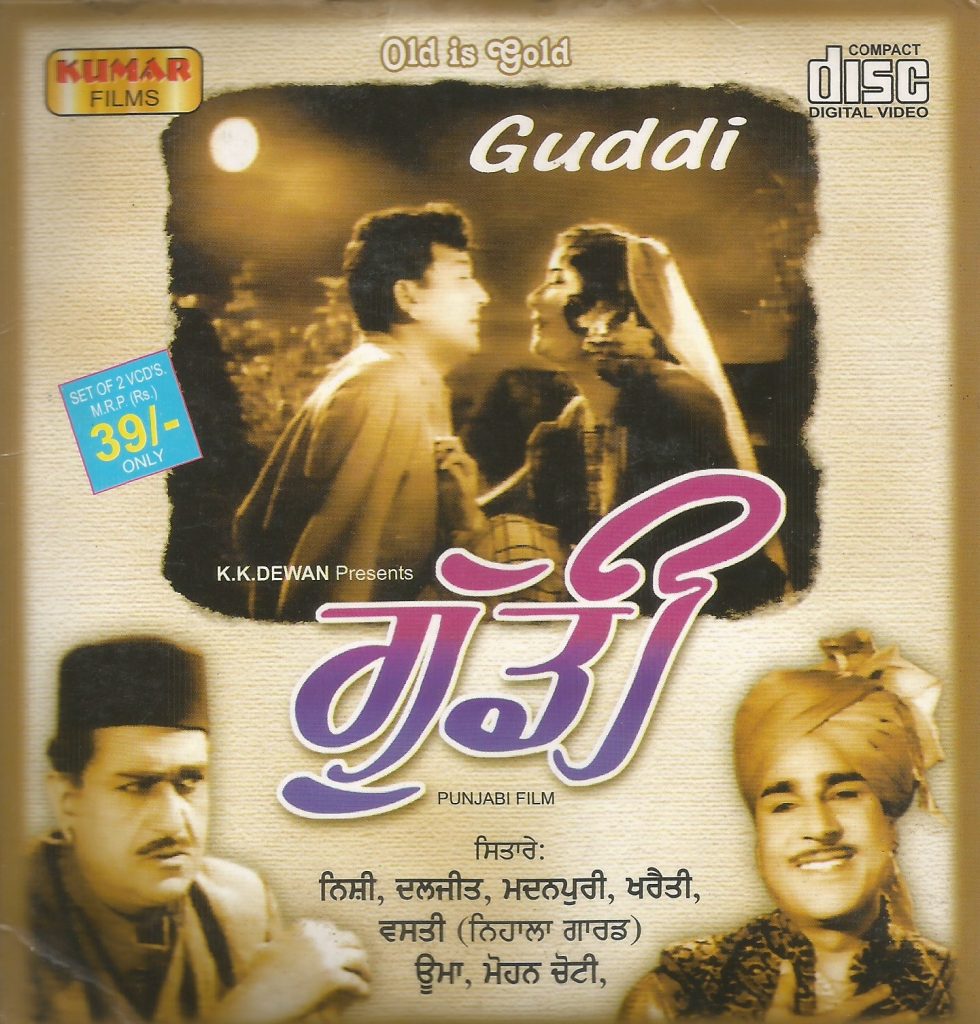Yet another collaboration between actress Nishi, director Jugal Kishore, composer Hansraj Behl, and singers Shamshad Begum and Mohammed Rafi, Guddi is one of the most popular Punjabi films ever made in India. The film pretty much follows the standard Bhangra (1959) formula except that here you have a proper full fledged hero, Daljit, opposite Nishi as against the comedy hero, Sunder, in the earlier film.
Guddi is a typical product of the Punjabi film of the times. Shot largely in Bombay studios (Mohan and Filmistan) and thereby unable to avoid its stagey look, the film takes an uncomplicated story and gives it a simple enough treatment and style. There is no real big surprise in the narration, the story too is fairly predictable but you go amiably along with it as it makes its way to its final happy ending. Of course, like most Punjabi films of yesteryear, Guddi too is a rural drama with all the right ingredients – the romanticized pind (village), the gaon ki gori (village belle), the shehri babu (city man) in a a Government job in the village, the village rogue, the kind hearted uncle, and above all, a small complication that is easily solved. All this is embellished with hummable songs and some robust dancing by Nishi. In that sense, as I said, it is stereotypical fare.
So in terms of story, we have Guddi (Nishi), the daughter of the retiring stationmaster, Khushi Ram, of a village. Initially, she is hostile to the new, young stationmaster (Daljit) but soon the two fall in love. The rogue of the village, Dara (Madan Puri), also has his eyes on Guddi and even approaches her father for her hand in marriage but is rebuked for obvious reasons. Meanwhile Guddi’s friend, Gulabo (Uma Khosla), too falls for the new stationmaster but obviously, he does not return her love. Nihala Guard (Wasti), the friend of the retired stationmaster from Hoshiyarpur, comes to stay with him and continues to do so despite various attempts by Guddi’s parents to get him to leave. Dara and the young stationmaster have an altercation over Guddi and in the ensuing fight, Dara knocks out the stationmaster. He takes the key of the station office from him and he and Gulabo steal the money from there, thus framing the young man who is arrested. Guddi agrees to marry Dara so that he would let the stationmaster go free…
It’s interesting to note that while Hindi cinema by then was truly a male bastion, it was Nishi who was the biggest draw in Punjabi cinema and the story of most of these films were centred on her. Many like Guddi or Laajo were, in fact, named after her character in the film. But even if she was the centre of attraction, there was, of course, a limit to what the heroine could do and could not do. She could fall in love and dance around the hero but when the crunch came, she could do nothing more than sacrifice her love or wait for someone else, in this case Nihala Guard, to take matters into his own hands and ensure that the customary happy ending takes place.
Nishi is fine enough in the film as the fiesty village belle and her dances as usual were extremely popular especially the Ni Tut Jaye Rail Gaddiye number. Daljit has nothing much to do as the hero and is just about so-so while Madan Puri is his efficient, slimy self as the village rogue. The scene stealer easily is 1940s hero, Wasti, as Nihala Guard and it is he who gives the film many of its best moments. Little wonder then that the epilogue goes on endlessly with him after Guddi’s marriage as he finally leaves and returns to Hoshiyarpur.
Hansraj Behl’s music is a definite big, big plus for the film, lifting it up a notch or two. The pick of the songs is undoubtedly the romantic duet, Pyar De Bhukele rendered beautifully by Lata Mangeshkar and Mohammed Rafi. Ni Tut Jaye Rail Gaddiye as Guddi waits for the stationmaster, who is delayed by the late arrival of the train, is another extremely well-composed song and a triumph for Shamshad Begum. As is also Kachi Tut Gayi Jinah Di Yaari. Suman Kalyanpur too scores with the sad Kissi De Na Toote Rabba.
All in all, Guddi is time pass and undemanding, watchable enough fare.
Punjabi, Drama, Black & White



Nice information